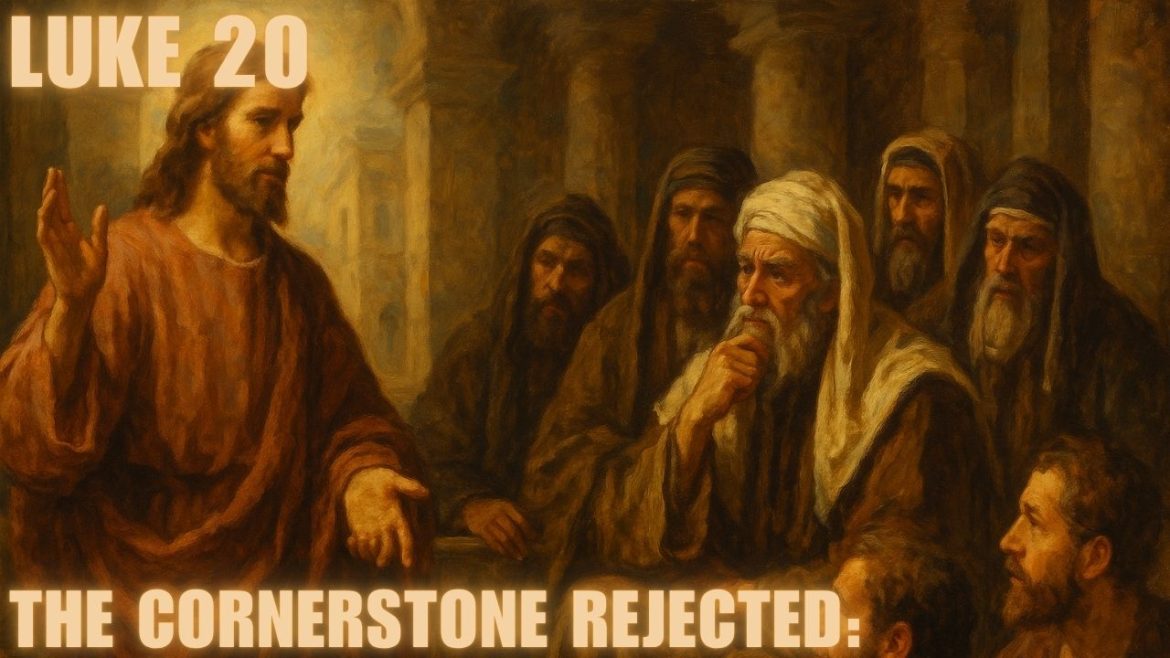In a world where questions can be weapons and words are often twisted for political gain, Luke 20 shows us a powerful lesson in wisdom, grace, and the divine clarity of Jesus. This chapter reveals how Jesus stood firm amid religious leaders’ plots and how He exposed the heart behind their challenges—not with aggression, but with piercing truth. As we look at this text, we see more than theological arguments—we see the nature of God in action, calling His people to clarity, justice, and a higher way of thinking.
Questioning Authority: Who Gave You This Right?
The chapter opens with religious leaders demanding to know where Jesus got His authority. Rather than play their game, Jesus flips the script by asking about John the Baptist’s baptism—was it from heaven or man? The brilliance of His response lies not just in evading their trap, but in revealing their motives. They weren’t interested in truth. They were preserving their power. And Jesus didn’t cater to politics—He revealed hearts.
This moment teaches us an important lesson: Not all questions are asked in good faith. Sometimes, discernment means responding with wisdom rather than direct answers. Jesus modeled how to navigate manipulation with grace and clarity.
The Parable of the Tenants: A Prophetic Warning
Next comes a striking parable—about a vineyard owner who sends servants to collect what is owed, only for the tenants to beat them and eventually kill the owner’s son. This isn’t just a moral tale. It’s a prophetic summary of Israel’s history: God’s messengers (the prophets) were rejected, and now, even His Son (Jesus) will be killed.
What’s powerful here is Jesus’s open accusation. He’s not just telling a story—He’s proclaiming judgment on the religious elite who have rejected God’s messengers for centuries. And the people around Him know it. The message is clear: rejection of God leads to destruction, but even the stone that’s rejected becomes the cornerstone of God’s kingdom.
This metaphor speaks volumes. In our lives, what truths do we reject because they don’t fit our narrative? What “stones” do we dismiss, not realizing they’re the very foundation we need?
Traps, Taxes, and Allegiances
The religious leaders then try again—with spies sent to flatter and trap Jesus with a loaded political question: Should we pay taxes to Caesar? This question was meant to pit Him either against the people (if He said yes) or against Rome (if He said no). But Jesus, in yet another moment of divine insight, asks for a coin. “Whose image is on this?” Caesar’s. “Then render to Caesar what is Caesar’s, and to God what is God’s.”
Jesus acknowledges the reality of earthly systems without giving them ultimate authority. His focus is on deeper truth: We bear God’s image—so our lives belong to Him. It’s a stunning reframing of the question, lifting the issue from mere politics to eternal perspective.
For us, it’s a reminder that while we live under governments and systems, our ultimate allegiance belongs to God. We are His. Every action should reflect that.
A Trick from the Sadducees: The Ridiculous Marriage Puzzle
Next, the Sadducees—who deny the resurrection—present Jesus with a bizarre hypothetical about a woman married to seven brothers. Their goal is mockery, not clarity. But Jesus again answers with truth that transcends their narrow thinking. In the resurrection, people won’t marry as they do on earth. Life after death isn’t just an extension of earthly habits—it’s something far more profound.
Then He makes a brilliant move—quoting from the Torah (the only scripture the Sadducees accepted). He says that God is the God of Abraham, Isaac, and Jacob—not was. God is not the God of the dead, but of the living. With this, Jesus not only affirms the resurrection but uses the Sadducees’ own text to prove it.
This shows us that truth often exists right under our noses—we just need the eyes to see it. And it reminds us that God’s promises are not dead history—they are living, breathing hope.
The Son of David and the Lord of All
In a moment that challenges their understanding of the Messiah, Jesus questions how David could call his descendant “Lord.” This points to something the Pharisees and scribes missed: the Messiah isn’t just a human ruler. He is divine. Jesus is both Son of David and Son of God. This deeply theological statement shows how Jesus didn’t just fulfill prophecy—He surpassed expectations.
This is a moment of revelation. When we limit God to what we understand, we risk missing His full majesty. Jesus invites us into a bigger picture—one that transcends human expectations.
Hypocrisy Exposed: Devouring Widows’ Homes
Finally, Jesus warns His disciples to beware of the scribes, who wear long robes, seek public honor, and yet secretly exploit the vulnerable—especially widows. This is a sobering call-out. True spirituality isn’t about appearances; it’s about justice, humility, and love.
The religious leaders had authority but lacked compassion. They had knowledge but lacked wisdom. Jesus wasn’t just challenging their theology—He was exposing their character.
This passage challenges us to examine our own faith. Are we seeking status or living sacrificially? Do we look spiritual while ignoring those in need?
Conclusion: Wisdom, Courage, and the Heart of God
Luke 20 shows Jesus under pressure—but not shaken. His answers reveal the heart of God: justice, truth, compassion, and authority that doesn’t need defending. His teachings weren’t just smart—they were saturated with divine purpose.
As modern readers, we are called to the same kind of wisdom. We need to recognize when questions are sincere and when they are traps. We are invited to be part of God’s kingdom—not as religious performers, but as people who give to God what is God’s—our hearts, our minds, our very lives.
Let this chapter inspire us to think bigger, live bolder, and seek truth—not just in arguments, but in love, in justice, and in faith.

